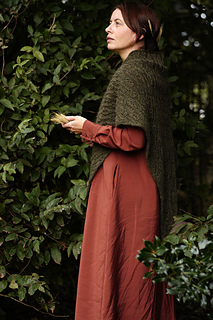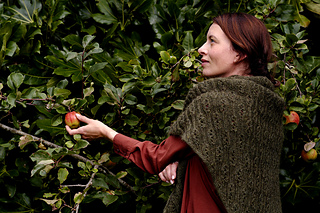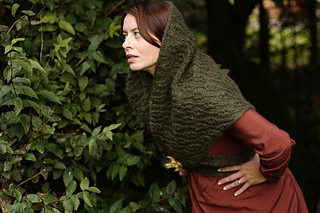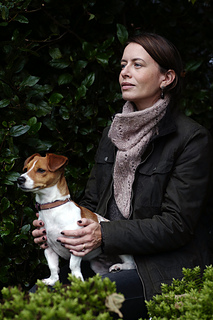patterns >  Ailbíona McLochlainn and 1 more...
Ailbíona McLochlainn and 1 more...
> Harvest Season Shawl













Harvest Season Shawl
HARVEST SEASON SHAWL
Wrap yourself in a swathe of rustic elegance with this strikingly textured shawl. The eyelet motif evokes vast fields of wheat rustling in the breeze, ready for harvest. Worked in the round and steeked open, this classic design offers both familiar and unexpected elements, while the tip-up construction enables you to decide on the size as you go along.
This patterns offers options for 3 variations on the triangular shape, as well as bonus instructions for a kerchief-hat and a cowl.
Pattern includes charts, as well as written instructions.
…….
MATERIALS & INFORMATION
Construction
This triangular shawl is made from the tip up, with options for symmetrical deep, symmetrical shallow, and asymmetrical shaping. The shawl is worked in the round, and steeked open (see additional notes at the end)
Gauge
17 sts x 23 rounds = 10cm/ 4” x 10cm/ 4” in pattern
(or any gauge)
Sizing
150cm/ 60” wingspan, or as preferred
Yarn
suitable for steekable yarns,
sport-DK weight (200-250m/ 225-250y per 100g/ 3.5oz)
or any weight, per preference
project requires up to 3 100g/ 3.5 skeins if worked at stated weight and gauge
sample made with Honer och Eir Nutiden yarn, held double
in the Stem colourway
the deep symmetrical version used 2.5 plates (250g)
Needles
circular needle, 4mm in diameter or as needed to meet gauge
Notions
tapestry needle, measuring tape, sewing needle, sewing thread, scissors
Special Techniques
Magic loop (optional), basic lace, increasing in pattern, steeking, basic sewing
….
ADDITIONAL NOTES - PLEASE READ BEFORE BUYING!
Steeked Construction
Please be aware this shawl is worked in the round with a steek, then cut open after completion. This is not an optional element of the pattern; you cannot convert it to flat knitting because the lace repeat chart only works in the round. That said: Steeking is truly easy; all you need to make sure of is that you use a suitable yarn. But if you categorically do not want to steek, this is not the right pattern for you.
Increasing in Pattern
Charts are provided for the main pattern repeat. Additionally, increases are charted for the initial 52 rounds, with accompanying stitch-by-stitch written instructions. Beyond this point, the knitter is expected to understand how to increase in pattern while referring to the main chart only. Some knitters find it extremely intuitive to increase in pattern. Others do not. If you know yourself to be in the latter category, this is perhaps not the right project for you. Alternatives for a short kerchief-hat (or a simple cowl which requires no increasing at all) are provided, should you try the main pattern and find it too difficult.
2440 projects
stashed
4888 times
30191 projects
stashed
18722 times
65192 projects
stashed
61859 times
139 projects
stashed
99 times
1839 projects
stashed
2044 times
10 projects
stashed
7 times
9970 projects
stashed
12145 times
46 projects
stashed
71 times
- First published: October 2022
- Page created: October 28, 2022
- Last updated: August 20, 2025 …
- visits in the last 24 hours
- visitors right now





